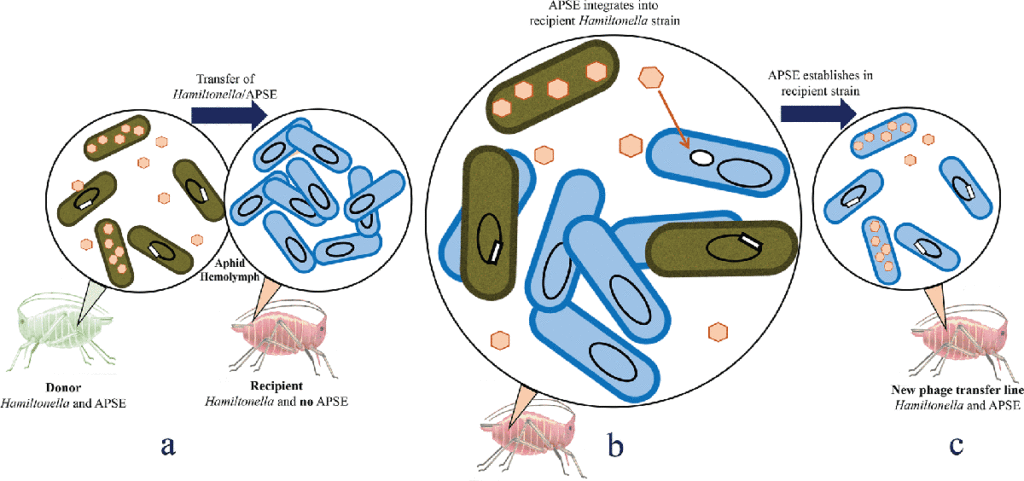Bacteriophage acquisition restores protective mutualism
 Insects are frequently infected with inherited facultative symbionts known to provide a range of conditionally beneficial services, including host protection. Pea aphids (Acyrthosiphon pisum) often harbour the bacterium Hamiltonella defensa, which together with its associated bacteriophage A. pisum secondary endosymbiont (APSE) confer protection against an important natural enemy, the parasitic wasp Aphidius ervi. Previous studies showed that spontaneous loss of phage APSE resulted in the complete loss of the protective phenotype. Here, we demonstrate that APSEs can be experimentally transferred into phage-free (i.e. non-protecting) Hamiltonella strains. Unexpectedly, trials using injections of phage particles alone failed, with successful transfer occurring only when APSE and Hamiltonella were simultaneously injected. After transfer, stable establishment of APSE fully restored anti-parasitoid defenses. Thus, phages associated with heritable bacterial symbionts can move horizontally among symbiont strains facilitating the rapid transfer of ecologically important traits although natural barriers may preclude regular exchange.
Insects are frequently infected with inherited facultative symbionts known to provide a range of conditionally beneficial services, including host protection. Pea aphids (Acyrthosiphon pisum) often harbour the bacterium Hamiltonella defensa, which together with its associated bacteriophage A. pisum secondary endosymbiont (APSE) confer protection against an important natural enemy, the parasitic wasp Aphidius ervi. Previous studies showed that spontaneous loss of phage APSE resulted in the complete loss of the protective phenotype. Here, we demonstrate that APSEs can be experimentally transferred into phage-free (i.e. non-protecting) Hamiltonella strains. Unexpectedly, trials using injections of phage particles alone failed, with successful transfer occurring only when APSE and Hamiltonella were simultaneously injected. After transfer, stable establishment of APSE fully restored anti-parasitoid defenses. Thus, phages associated with heritable bacterial symbionts can move horizontally among symbiont strains facilitating the rapid transfer of ecologically important traits although natural barriers may preclude regular exchange.
Nicole L. Lynn-Bell, Michael R. Strand, Kerry M. Oliver. 2019. Microbiology.; doi: 10.1099/mic.0.000816.
